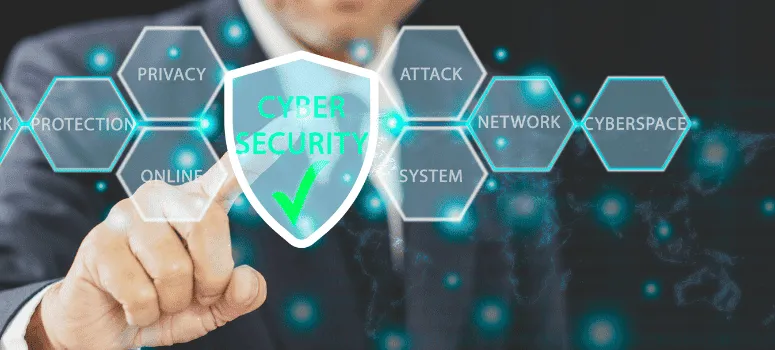Blog
Essentials To Achieve Information Security Compliance

Essentials To Achieve Information Security Compliance
Achieving information security compliance is crucial for any organization, especially in the rapidly evolving cybersecurity landscape. In this blog, we’ll cover why regulatory compliance is vital, the cybersecurity compliance essentials in the GCC region, and practical strategies for aligning organizational policies with regulatory standards. Plus, we’ll share insights from a case study and answer some common FAQs.
Why is Regulatory Compliance Critical?
Regulatory compliance in Cybersecurity is crucial in cybersecurity because it creates a consistent foundation for security practices. Compliance ensures that organizations meet specific cybersecurity standards, protecting sensitive data from unauthorized access and misuse. When an organization adheres to regulatory guidelines, it reduces the risk of data breaches and their associated financial costs. For example, data breaches in the Middle East now average $7.45 million per incident.
In regions with extensive oil, gas, and financial industries, like the GCC, the consequences of non-compliance include both high penalties and reputational damage. Some GCC regulations impose fines of up to $1 million for non-compliance, making regulatory alignment not only a security need but also a financial imperative.
Importance of Compliance in Today’s Cybersecurity Landscape
Compliance is more than a legal requirement; it’s a strategic advantage in a threat-laden environment. With cyberattacks growing in sophistication, regulations aim to create stronger security postures, helping organizations stay resilient. Consumers are also becoming more aware of data privacy issues. A study found that 65% of consumers would stop using services from organizations involved in significant data breaches, which underscores the need for companies to build consumer trust through compliance.
A significant part of today’s compliance landscape involves organizations moving from checkbox-style compliance to value-driven strategies. Unlike checkbox compliance, which meets minimum requirements, value-driven compliance integrates cybersecurity into organizational culture and continuously evolves with emerging threats.

Overview of Key GCC Cybersecurity Regulations
The GCC has implemented stringent cybersecurity regulations to address the rising threat of cyber incidents. Here are some of the most prominent standards:
- Saudi Arabian Monetary Authority (SAMA) Cybersecurity Framework – Aimed at financial institutions, this framework covers multi-factor authentication (MFA), role-based access, and least privilege policies.
- National Cybersecurity Authority (NCA) Regulations (KSA) – The NCA has guidelines covering essential areas like threat intelligence (CTI), incident response, and post-incident review.
- Central Bank Regulations (UAE, Qatar, Oman) – These guidelines focus on specific financial regulations, often emphasizing data privacy and robust access controls.
- CMA Cybersecurity Guidelines – Aimed at capital markets, these guidelines focus on securing trading and financial platforms.
- DESC ISR Framework (Dubai) – A regulatory standard to secure IT systems within Dubai, aimed at enhancing resilience to attacks on critical infrastructure.
To stay competitive, organizations in the GCC must navigate this complex landscape and ensure compliance with multiple frameworks, often simultaneously.
Strategies to Align Organizational Policies with Regulatory Standards
Achieving compliance requires well-defined strategies that bridge the gap between regulatory standards and organizational policies. Here are some effective techniques for alignment:
-
Unified Compliance Framework:
Implement a single framework that encompasses multiple standards (e.g., NCA, SAMA, and ISO27001). This approach simplifies compliance, streamlines audits, and helps the organization maintain alignment across all regulatory requirements.
-
Risk-Based Prioritization:
Not all risks are equal. Organizations should identify high-priority risks that could lead to significant financial or reputational damage and allocate resources accordingly.
-
Security-Aware Culture:
Training employees on specific compliance requirements fosters an organizational culture that is security-focused. This not only boosts compliance but also minimizes insider risks.
-
Continuous Monitoring and Real-Time Audits:
Conduct ongoing monitoring and audits to identify compliance gaps proactively before they become critical issues.
-
Strategic Communication:
Communicate compliance efforts and challenges regularly with stakeholders and regulators. Transparency fosters trust and can help avoid misunderstandings during audits.

Practical Tips for a Value-Driven Compliance Strategy
-
Clear Policies and Procedures:
Outline policies that match regulatory requirements and regularly update them to reflect changes in the regulatory environment.
-
Leadership Buy-In:
Leadership should advocate for compliance as a strategic asset. Engaged leaders ensure adequate resource allocation for compliance initiatives.
-
Integrated Security Operations:
Embed value-driven security measures in daily operations. For example, ensure that sensitive data can only be accessed by authorized personnel through role-based access.
-
Risk-Based Approach:
Use dynamic risk assessments that adjust to new threats, helping organizations stay compliant with evolving standards.
-
Leverage Automation:
Automated tools can handle repetitive compliance checks, real-time monitoring, and reporting, helping maintain compliance while reducing manual effort.
Paramount’s Role in Helping Organizations Achieve Compliance
Paramount provides a robust framework and consulting expertise to help organizations in the GCC align with regional and international compliance standards. With over 30 years of experience and deep expertise in the Middle Eastern cybersecurity landscape, Paramount specializes in developing unified compliance frameworks. Their services include:
-
Compliance Audits and Assessments:
Paramount assists in identifying compliance gaps, offering a tailored roadmap to bridge them.
-
Training and Awareness Programs:
Customized programs ensure employees understand and actively support compliance objectives.
-
Automated Compliance Tools:
Paramount’s suite of tools simplifies compliance processes, reducing the burden on in-house teams.
-
Continuous Monitoring:
Real-time auditing and monitoring services help organizations stay compliant and proactively address risks.
Conclusion
More than 50% of organizations in the GCC are implementing automated tools to monitor compliance and conduct real-time risk assessments, making compliance more efficient and manageable.
Achieving information security compliance is more than just a regulatory necessity—it’s an integral part of a comprehensive cybersecurity strategy. By adopting a value-driven approach, aligning policies with GCC regulations, and leveraging expert guidance from firms like Paramount, organizations can build a strong security foundation that ensures compliance and protects against evolving cyber threats.

Case Study
A major telecommunications provider in Saudi Arabia faced challenges in complying with various GCC and international regulations, including NCA, SAMA, PCI-DSS, and ISO standards. The telecom sector’s high exposure to cybersecurity risks made compliance critical for the company’s operational integrity and reputation. Here’s a look at how they achieved compliance:
- Gap Analysis: The organization conducted a thorough assessment of existing practices against regulatory standards.
- Unified Compliance Framework: Paramount implemented a unified compliance framework that integrated all relevant standards.
- Risk Management and Monitoring: Continuous real-time monitoring helped identify compliance gaps, and a risk-based approach ensured critical risks were prioritized.
- Outcome: The organization achieved full regulatory compliance, enhanced its security posture, and improved operational efficiency through a centralized governance, risk, and compliance (GRC) platform.
Webinar:
Expert Insights on Achieving Compliance in the GCC
For a deeper understanding of achieving compliance, Paramount offers webinars that provide insights into GCC regulatory requirements, case studies, and best practices for achieving a compliant security posture. Experts like Deepesh Shah and Mohammad Mohiuddin, with years of experience across the GCC, share valuable strategies and answer questions on compliance alignment.

Protect your online assets from cyber threats with Paramount

Comprehensive cyber security solutions for individuals and businesses

Significantly reduce the risk of cyber threats and ensure a safer digital environment.
